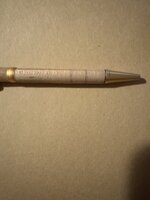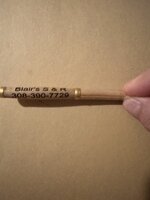Yeah, with friction polishes, you need to be careful with pressure. You want firm pressure, and a lot of back and forth movement, to produce friction and heat, but not so much that you are burning the applicator into the finish. That is surprisingly easy to do. I used to use Myland's friction polish on a lot of stuff, as well as home made O.B. Shine Juice. I've ditched both in favor of other finishes, though, as they can be a bear at times (beyond their propensity to go bad, shellac doesn't last forever, which then makes them even harder to deal with.)
For pens, aside from Pens Plus, its best to steer clear of friction polishes or anything with a natural wax (i.e. carnauba, bees, etc.) as they aren't really up for the kind of use a pen gets. Pens Plus's microcrystalline wax is a high grade, hardening synthetic wax with small crystals that produces a durable, crystal clear film, and is significantly more reliable for pens than other friction polishes. Note, though, that it too has shellac, and it will go bad (had this happen to me twice now, and I've not been able to get through an entire bottle...) I really like the look of a glassy clear pens plus finish, but the cost of the bottle when you can only use about half of it, is pretty high.
I've recently switched to using GluBoost. It was actually something on my list to try for over a year here. My last bottle of Pens Plus went bad (shellac is a natural secretion from the Lac bug, so it breaks down over time and will go bad in solution), and I decided to give GluBoost a try. Its amazing stuff, and I think its now my favorite finish. I've tried other CA glues, but I have never been able to get results like GluBoost delivers, and its a lot safer too (I have a severe allergic/toxic reaction to most CA, but GluBoost is low fume, low odor, and I have not had any major issues with it.)
I've also worked with polyurethane finishes as well. This will also create a durable finish, and one that might be even more resilient to scratches than CA. I've applied wipe on poly with a rag and foam brush. Results are ok, but there are resources (PDFs) here on IAP that show how to use a dipping method to get much better results, which might be worth a try.
Another option is Craft Coat. I have a bottle of that stuff, and its another hard, durable coating. I think its urethane based, IIRC, but a water based form I think. Anyway, it produces a nice hard finish that can either be left satin and thin, to let the wood character show through, or built up a bit and sanded back/polished smooth for a nice shiny hard finish. Being water based, you might need to work the first coat a bit to get it to saturate into the wood well, otherwise it might form more of a surface coat (which doesn't bring out the chatoyance of the wood as well as poly, or CA.)
In any case...it is worth looking into other finishes. If you really like friction polish, then I'd try a bottle of Pens Plus. I have shared my techniques with it a few times on these forums...you can search through my posts to find some of them. Otherwise, I'd look into one of the hard, durable finishes. Wipe On Poly is actually pretty easy to use, and might make a good first trial. It will produce a more lusterous sheen, than a shiny glossy finish, but that is part of its appeal!

You do need to let each coat dry for a while, then cut it back just a bit to smooth it out, before applying the next. You can apply a few coats pretty easily though, and it will make for much more durable pens. CA can be a bit more challenging, as you only have a few seconds to apply each coat, but its also a good reliable finish. I'd do some research on how to apply it, what applicator (i.e. foam) is best to get smooth results without wasting much of the CA.
Another possible option, although not necessarily the most ideal, might just be a plain oil finish. Finishing oils will polymerize and cure to a hard-ish finish over about 20 days or so. They can make a nice satin finish that can bring out the chatoyance of the wood nicely. The key drawback is you need to wait the full 20-30 days for the oil to harden, otherwise it won't be resilient to use and will leave an oily residue on the user's fingers. Plain oil finish can be buffed to a very nice shine, too, if that's what you want. Not as hard and resilient as CA, poly, or craft coat, but probably better than friction polish.


